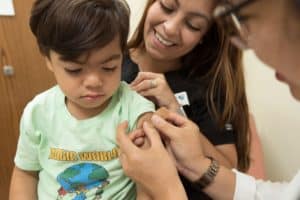 It’s World Immunization Week, a time when the global health community comes together to promote immunization and emphasize the important role vaccines play in protecting the world from disease. For those of us living in the developed world, vaccines can be easy to take for granted, but COVID-19 has reshaped that perspective. While the narrative around immunization over the last few years was dominated by vaccine skepticism, we now find ourselves in a situation where citizens across the world are checking the news daily for updates on COVID-19 vaccine development.
It’s World Immunization Week, a time when the global health community comes together to promote immunization and emphasize the important role vaccines play in protecting the world from disease. For those of us living in the developed world, vaccines can be easy to take for granted, but COVID-19 has reshaped that perspective. While the narrative around immunization over the last few years was dominated by vaccine skepticism, we now find ourselves in a situation where citizens across the world are checking the news daily for updates on COVID-19 vaccine development.
Immunization is widely recognized as one of the most successful technologies ever created by humans, as well as one of the most cost-effective healthcare interventions. Every year immunization saves millions of lives around the world from diseases like measles, tuberculosis, diphtheria and more. According to the WHO, 86% of all infants born are vaccinated every year with antigens that prevent more than 20 life-threatening diseases.
When it comes to the current pandemic, it’s extremely important that we recognize and mitigate the impact that COVID-19 will have on routine immunization in low and middle-income countries. Even during this global crisis, we must continue to address the gaps that existed before the pandemic started to ensure no one misses out on receiving life-saving vaccines.
Since the first vaccine was created in 1796, humans have benefited immensely from their health benefits. One hundred years ago in the United States, the child mortality rate was 100 for every 1000 live births, today it is 5.8, and vaccines deserve a huge portion of the credit. Yet it is much more recently that low and middle-income countries began realizing the benefits of providing immunizations at scale. Thus, in the 1900s international immunization programs were created to help bring the benefits of vaccines to low and middle-income countries around the globe.
By the late 1990s, the progress of international immunization programs began to stall. There were nearly 30 million children in developing countries who were not fully immunized against deadly diseases, and many others who had no immunization at all. To address this growing problem the World Health Organization (WHO), UNICEF and numerous other generous international donors formed Gavi, the Vaccine Alliance.
Since its founding, Gavi has made a lot of progress, but in 2018 there were still an estimated 19.4 million children who did not receive all of their recommended vaccines prior to turning one. Most of these children either live in remote areas, conflict zones or informal settlements in rapidly urbanizing areas. I am proud to say that Premise is an INFUSE pacesetter and is working with Gavi to address urban immunization shortfalls across the developing world.
The mass vaccination campaigns and routine immunization programs through front-line health clinics that delivered much of the past gains in low and middle-income countries may not be enough to reach the remaining 19.4 million children. I believe a more differentiated approach, based on data, is required.
Premise’s contributors, using a smartphone app, are helping monitor immunization service delivery to help health systems understand where the system is not performing as desired. Often caregivers take their children to be immunized only to find the session was canceled or that not enough children showed up to warrant opening the vial. We are also conducting household visits to identify children who were not vaccinated or didn’t receive all the required doses. This data is vital to improved targeting of campaign-based immunization or outreach activities to get kids brought into clinics.
To save lives, reduce poverty and protect against epidemics Gavi relies on direct contributions from governments, foundations, private sector partnerships, and more to continue its efforts. Every five years Gavi raises funds to continue its work and 2020 happens to be its replenishment year. In addition to addressing the obstacles to complete immunization coverage, Gavi will also likely be charged with the distribution of an eventual COVID-19 vaccine. If I have learned anything during this pandemic it’s that we must continue to ensure children around the globe have access to routine immunization. I encourage you to please consider making or expanding your contribution to Gavi if you work for a large government or public health donor agency.